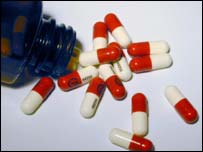
Some doctors may be prescribing unsuitable
drugs |
Experts
have called for new rules governing the relationship between the
medical profession and the pharmaceutical industry.
It follows claims that some drug companies may have undue
influence over what medicines doctors prescribe to patients.
Several studies published in this week's British Medical Journal
(BMJ) suggest that this influence may cause some doctors to
prescribe unsuitable and unnecessary drugs.
They raise questions about the free gifts given by companies to
doctors and the way the industry funds research, medical conferences
and education seminars.
Free gifts
Drug company representatives visit thousands of doctors every
week to inform them about new or existing products. They often offer
doctors free gifts, such as stationery, mugs or key rings. Sometimes
the gifts may be more substantial.
One of the studies in this week's BMJ suggests this may encourage
some doctors to prescribe unsuitable drugs to patients.
 Doctors must not be, or be seen to be, influenced
in prescribing matters by any incentives from the
pharmaceutical industry Doctors must not be, or be seen to be, influenced
in prescribing matters by any incentives from the
pharmaceutical industry 
Dr Vivienne Nathanson, BMA
|
Researchers carried out a survey of 1,000 GPs across England.
They found that doctors who see company reps at least once a week
are more likely to consider prescribing new drugs and to agree to
patients' requests for medication even if they don't need it.
They suggested that in some cases reps may even target those
doctors who are most likely to prescribe their products.
Doctors are expected to only prescribe new drugs if there is
medical evidence to show they are effective.
The researchers said doctors should be given better guidelines to
ensure they only prescribe such medicines.
'Biased research'
A separate study, by researchers in Sweden, suggests that even
doctors who rely on research to decide which drugs to prescribe may
also be unwittingly colluding with the pharmaceutical industry.
The researchers said this was because studies into new drugs were
sometimes biased. They suggested that industry-funded trials were in
some cases only published if they included favourable results.
 The UK-based pharmaceutical industry strives to
maintain the highest possible ethical standards The UK-based pharmaceutical industry strives to
maintain the highest possible ethical standards 
|
And they said a lack of access to negative studies meant some
doctors were probably prescribing drugs on the basis of biased
research.
Their findings were backed up experts in Canada. They reviewed 30
studies analysing research projects, which had been funded by a
pharmaceutical company.
They found that these studies were more likely to come up with
results that favoured the company compared with those that received
funding from other sectors.
But they also found that these studies were less likely to be
published in medical journals.
Richard Smith, editor of the BMJ, said the studies showed that
the relationship between the medical profession and industry needed
to change.
"Our central argument is that doctors, drug companies and most
importantly patients would all benefit from greater distance between
doctors and drug companies," he said.
Ray Moynihan, a medical journalist and guest editor of this
week's BMJ, said the findings highlighted an unhealthy relationship
between the medical profession and the drugs industry.
"We hope this will spark a broad debate about how to clean up the
unhealthy aspects of the relationships between doctors and drug
companies," he said.
Patient's needs
The Association of the British Pharmaceutical Industry (ABPI)
said companies were expected to adhere to strict guidelines when
informing doctors about new products. It said the onus was on
doctors to ensure they prescribed effective medicines.
Dr Trevor Jones, the association's director general, added: "The
UK-based pharmaceutical industry strives to maintain the highest
possible ethical standards in its dealing with healthcare
professionals and other stakeholders."
The British Medical Association (BMA) said it hoped the studies
would lead to a debate about the best way to prevent drug companies
from inappropriately influencing doctors.
Dr Vivienne Nathanson, the BMA's head of science and ethics,
added: "The guidelines in the UK put fairly strict limits on
hospitality, gifts, sponsorship but should be constantly reviewed
especially against any evidence of abuse or ineffectiveness.
"The individual needs of the patient are paramount when a doctor
is prescribing medication.
"Doctors must not be, or be seen to be, influenced in prescribing
matters by any incentives from the pharmaceutical industry."